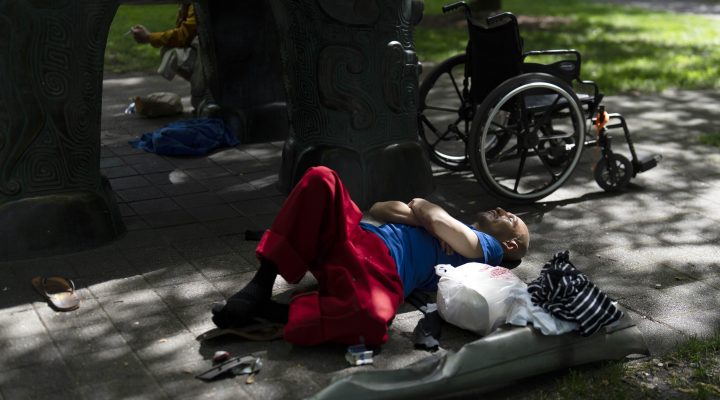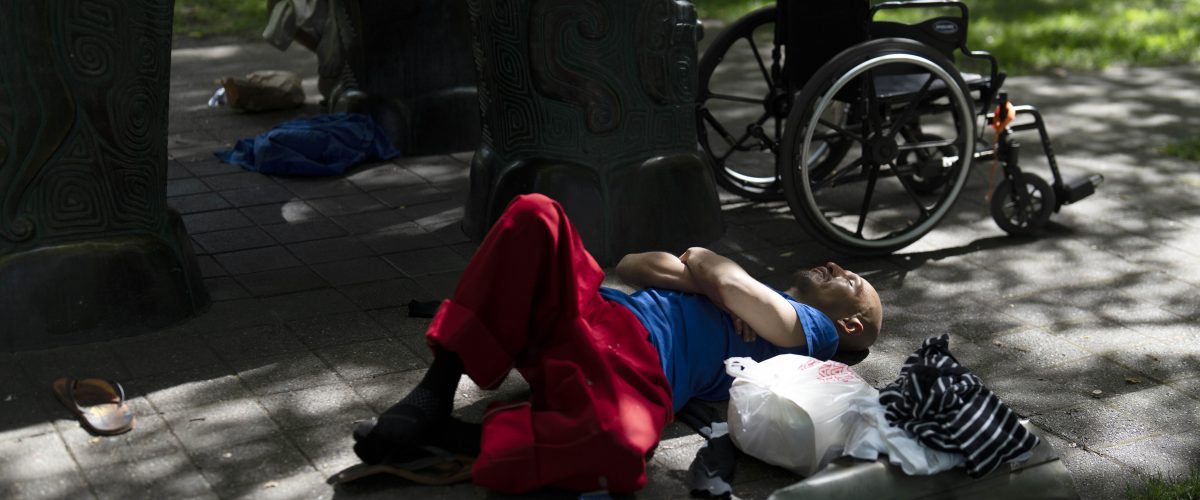The Supreme Court has upheld a ban on sleeping outdoors in a homelessness case. By a 6-3 vote along partisan lines, the court ruled homeless residents are prohibited from sleeping outdoors.
My own sense of the prophetic, especially when indignant, makes me like Elijah speaking truth to Jezebel and Ahab for stealing Naboth’s vineyard. Therefore, I call out the United States Supreme Court’s conservative justices for depriving homeless people of sleeping outside in an Oregon town because it’s bad for tourism.
The total lack of empathy displayed by the conservative majority doesn’t surprise or shock. They have been telegraphing they don’t care about anyone for quite some time.
The primary difference between the conservative justices and the liberal justices has to do with empathy. George Lakoff, in The Political Mind, reminds us, “Behind every progressive policy lies a single moral value: empathy.”
There is a deadly empathy deficit in a Supreme Court that counts corporations as “persons” and homeless people as “criminals.” Lack of empathy means not caring about others, especially the most vulnerable and the people mired in precarious situations.
While the Supreme Court’s conservative justices likely will continue to show preference for the rich and the powerful, I can only remind them of how far from the teaching of Jesus they have fallen: “Truly I tell you, just as you did not do it to one of the least of these, you did not do it to me” (Matthew 25:45).
Now, they are upholding a ban on sleeping outdoors. According to the court’s ruling, the ban “did not violate the Constitution’s prohibition of cruel and unusual punishment.”
The Supreme Court has ripped away protections for society’s most vulnerable citizens.
The legal arguments for upholding the ban pale against the reality that the Supreme Court has ripped away protections for society’s most vulnerable citizens. An unlikely coalition of conservatives and liberals urged the court to intervene. This included California Gov. Gavin Newsom. Affluent people, conservative and liberal, don’t wish to be bothered by homelessness.
The dispute at the heart of the Supreme Court ruling emerged in Grants Pass, Ore. City leaders banned sleeping in public spaces even though the town had no shelter open without restriction to all homeless people. The only homeless shelter was run by a church requiring the homeless to attend worship.
A town with no homeless shelter except a restrictive and overbearing religious one that uses the law to forbid sleeping outdoors is as far removed from empathy as heaven from hell. In Grants Pass, the law now says, “The homeless have nowhere to lay their head.”
When human beings are refused even the most rudimentary place to sleep, the town fathers are treating the homeless in ways suggesting they no longer see the homeless as fellow human beings. According to David Livingston Smith, in Less than Human, “This phenomenon is called dehumanization.”
In effect, the Supreme Court has criminalized homelessness. Armed with a victory from the high court, the Grants Pass town leaders will be able to round up homeless people. Tourists will not have to be bothered by the “ugly” spectacle of homeless people and their tents.
How did the conservative justices reach the decision that homelessness is not a state of being?
Justice Neil M. Gorsuch delivered the majority opinion. He connected the increase in homelessness with crime, drugs and diseases. His response concluded the city’s ban does not constitute “cruel and unusual punishment.” He lamented: “Homelessness is complex. Its causes are many. So may be the public policy responses required to address it.
Gorsuch has used the subtlety and complexity of legal language to obscure the impact of the ruling on homeless people.
His lack of empathy seems closely aligned to the decisions of the former mayor of New York, Rudy Guiliani. In 1994, Guiliani declared people in shelters were not homeless. His primary goal was to reduce the visibility of homeless people. One of his actions included putting homeless people on buses and transporting them to New Jersey. The gap between the Supreme Court and Guiliani is slender.
Justice Sonia Sotomayor read her dissent from the bench, symbolic of profound disagreement. “This is unconscionable and unconstitutional,” she said.
Justice Elena Kagan asked a lawyer for the city, Theane D. Evangelis, “Could you criminalize the status of homelessness?” Evangelis responded, “Well, I don’t think homelessness is a status like drug addiction.”
No one noted the high percentage of homeless people suffering from drug addiction and mental illness. “Homelessness is a status,” Kagan replied. “It’s the status of not having a home.”
While I am not a lawyer, I am a preacher. Instead of law books, I have the Bible, the word of God, as precedent. Gorsuch appeals to the First, Fifth, Sixth, Eighth and 14th amendments to the U. S. Constitution. I appeal to the laws of God in the Old Testament. As Elijah said to Ahab, “You and your father’s house have forsaken the commandments of the Lord.” I say the same words to the conservative justices.
Arguing from Leviticus 19, I assert the status of every homeless person in America as a person, as an equal person. Verses 33-35 lay out the law of God: “When an alien resides with you in your land, you shall not oppress the alien. The alien who resides with you shall be to you as the citizen among you; you shall love the alien as yourself, for you were aliens in the land of Egypt: I am the Lord your God. You shall not cheat in measuring length, weight or quantity. You shall have honest balances, honest weights, an honest ephah and an honest hin.”
The word “alien” encompasses our more modern words “immigrant” and “homeless.”
In other words, profits matter more than people.
Furthermore, it is prudent to note the economic implications of how the homeless are treated. This matters in the Oregon case because the town insists the tourist business is being harmed by the presence of the homeless. In other words, profits matter more than people.
Leviticus, however, insists on the priority of how the “alien” is treated and on economic justice at the same time.
In the laws of Leviticus and elsewhere, God protects the widow, the orphan and the alien. God protects the poor. Surely, this includes the homeless.
Every policy or law dealing with the poor in the Old Testament is rooted in empathy. Old Testament law provides “cities of refuge” for people accused of murder. People lacking homes, money and jobs are provided for when farmers are commanded to leave part of the harvest for the hungry ones.
Written large in the laws of God: Empathy for the poor.
The first responsibility of a government is to protect and empower its citizens. Governments are supposed to ensure that food and drugs and drinking water are safe, to care for the most vulnerable and the people who live in precarious situations.
The Supreme Court has violated the basic foundation of God’s law — empathy. The justices have been blinded by the most American of sins — greed. This greed sees only the profits made by tourism and not the basic needs of homeless people.
Empathy would lead the justices to recognize unfair and discriminatory treatment of the homeless is a form of harm. Empathy is the moral basis of protecting citizens from abuse by the courts. The Supreme Court has abused the homeless people, criminalizing homelessness.
The domestic policy of the Supreme Court ignores the real needs of real people — people created in the image of God, people included in “all persons are created equal” — including the poor, the hungry, the jobless, the homeless, the sick. The court has removed empathy and protection of the homeless from domestic policy and replaced it with corporate interests in profit. The court has protected the “tourist industry” over the material needs of flesh-and-blood human beings.
A Supreme Court determined to act without empathy for the homeless, poor, sick or hungry is a court void of humanity. Instead, they pose as greedy as Jezebel, who enlisted false witnesses and set up a fake trial that led to the stoning death of Naboth in order to obtain what her husband, Ahab, wanted.
This deserves condemnation, and I am happy to offer it to a callous, cold and uncaring group of Supreme Court justices. The lack of empathy in applying the laws of our nation indicates a lack of charity, compassion and understanding for the precarity in which homeless people live.
When the law lacks empathy, the law fails to serve the interests of all people. Laws void of empathy lead to oppression and dehumanization.
As the homeless groan under the severity of criminalization of their status, sooner or later God will hear their groaning, and God will respond out of his covenant of empathy on behalf of the homeless.
John the Baptist said to Herod, “It is wrong for you to have your brother’s wife.” Thus, I say to the conservative Supreme Court justices, “It is wrong for you to dehumanize the homeless, deny them status as persons and criminalize sleeping outdoors.”

Rodney Kennedy
Rodney W. Kennedy is a pastor and writer in New York state. He is the author of 10 books, including his latest, Good and Evil in the Garden of Democracy.
Related articles:
Supreme Court says cities may fine or arrest homeless people for sleeping
Supreme Court hears case that could empower cities to fine people for being homeless


